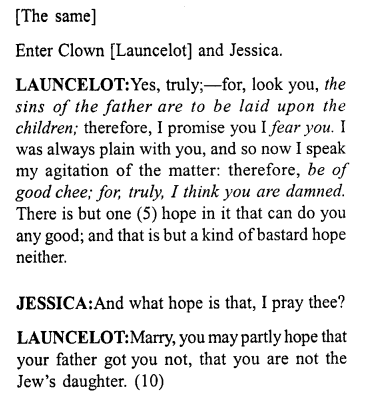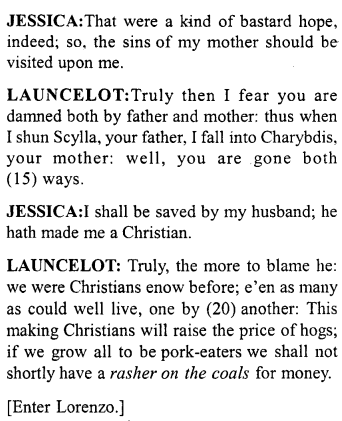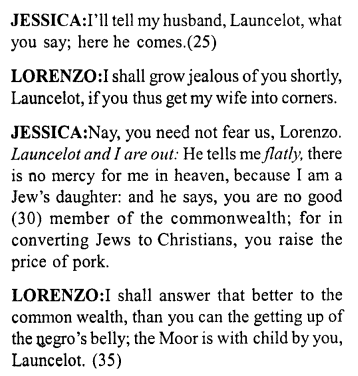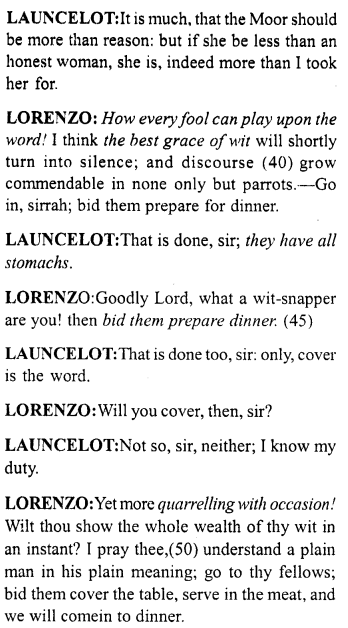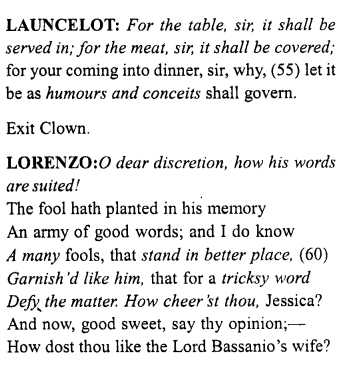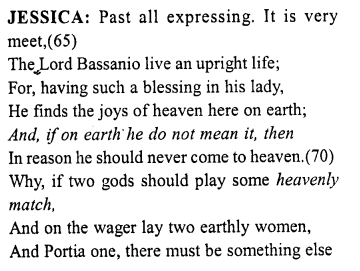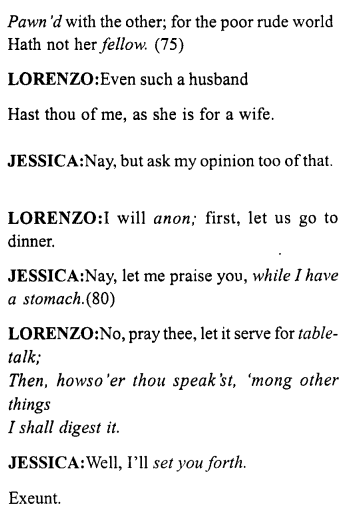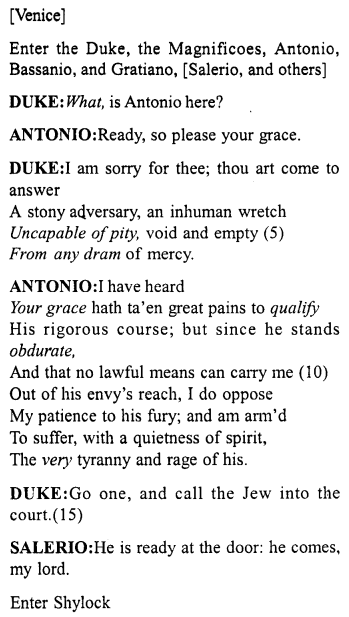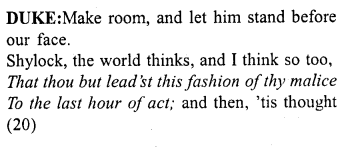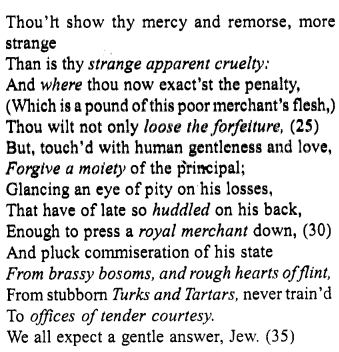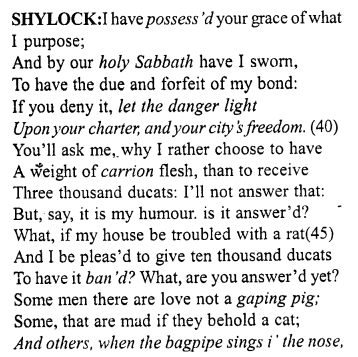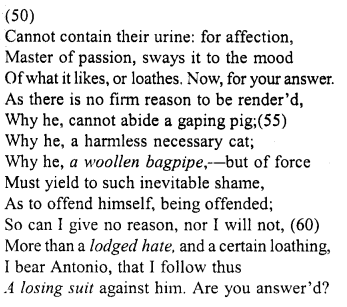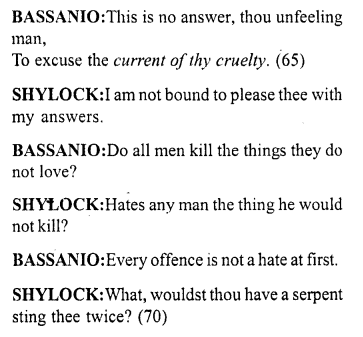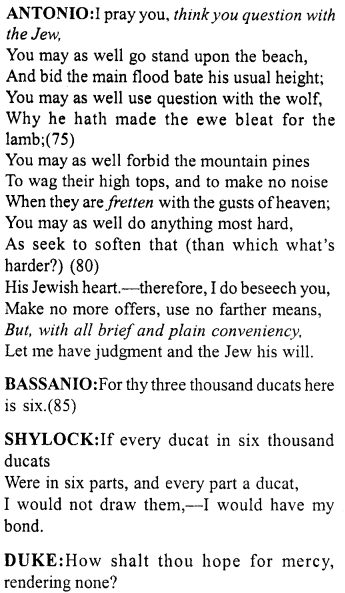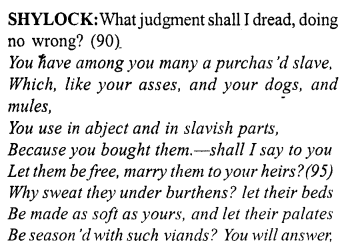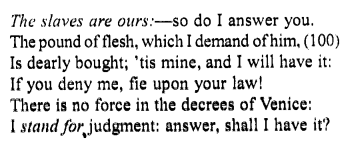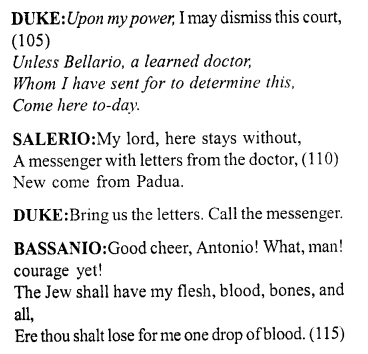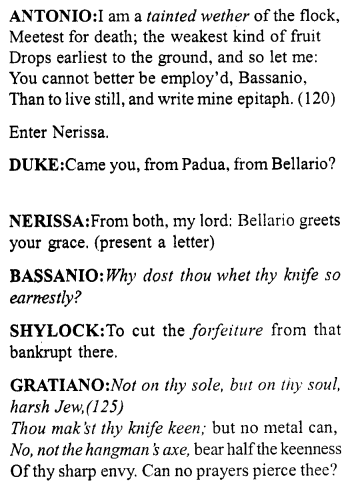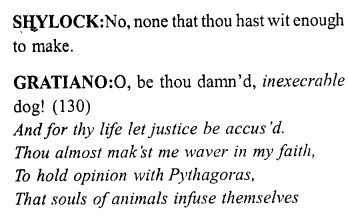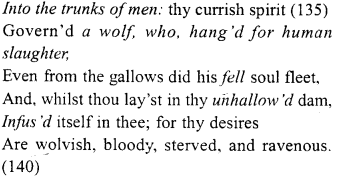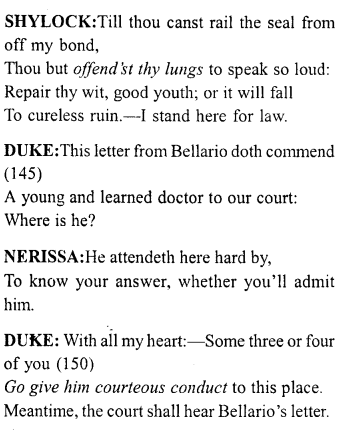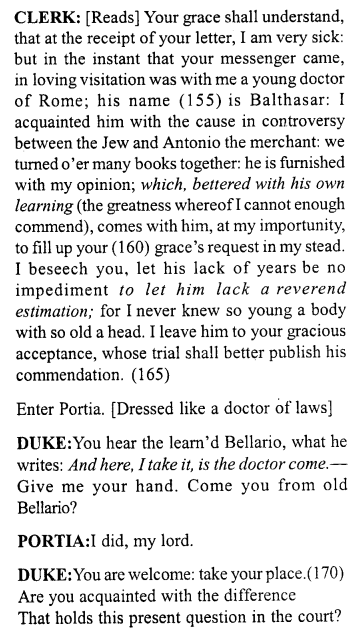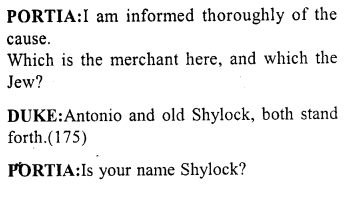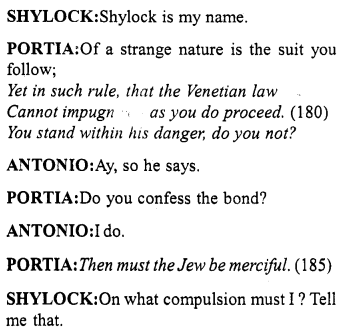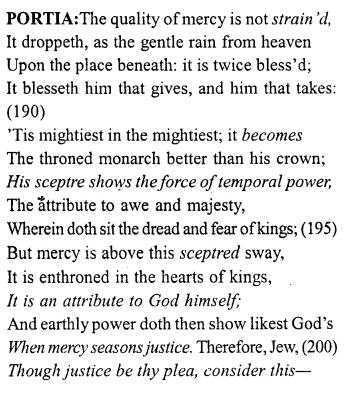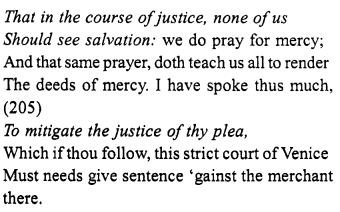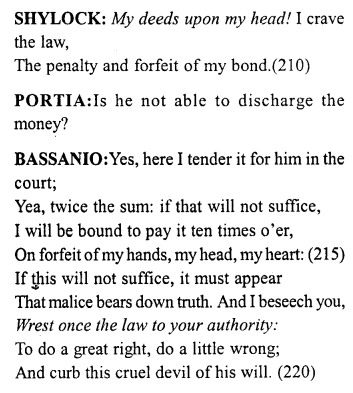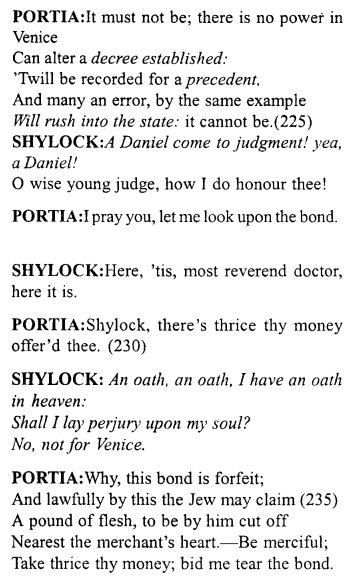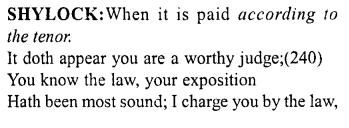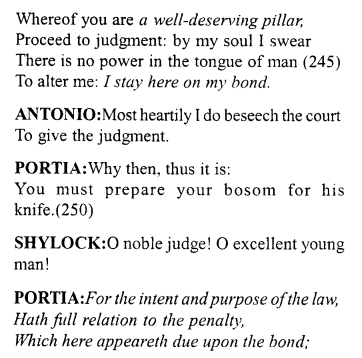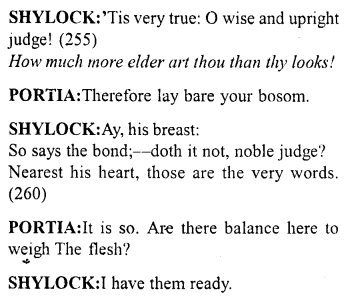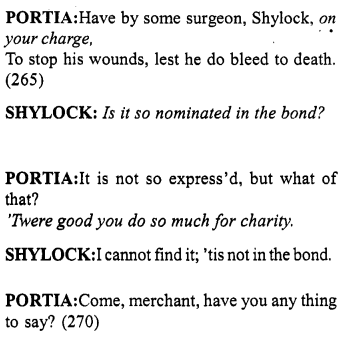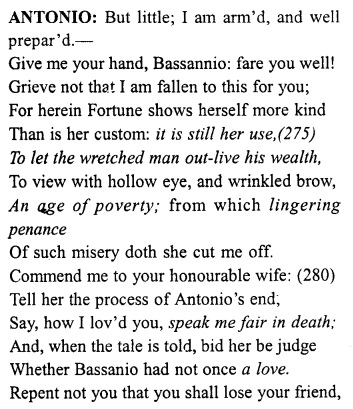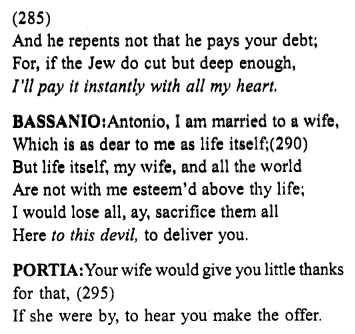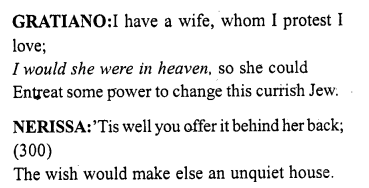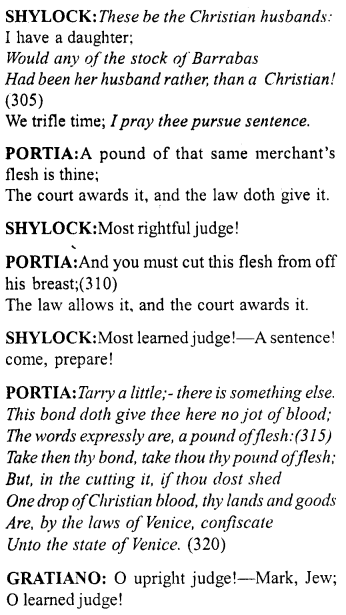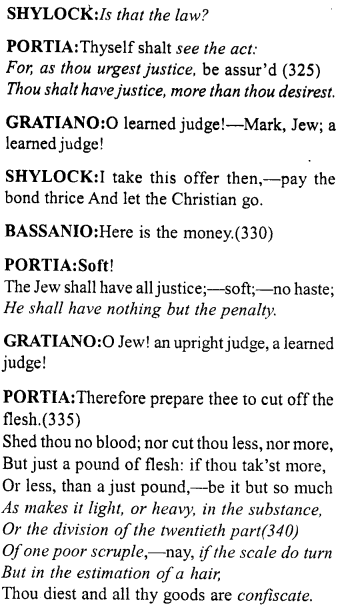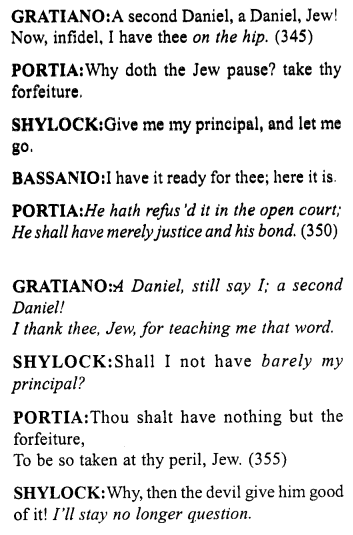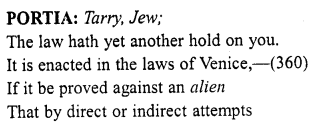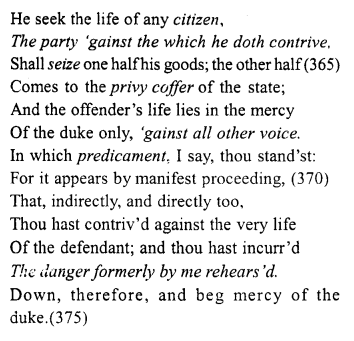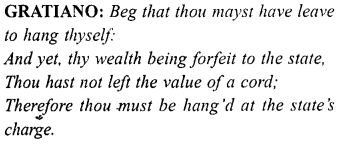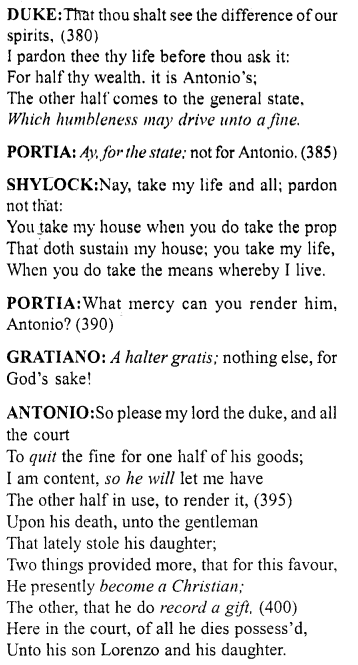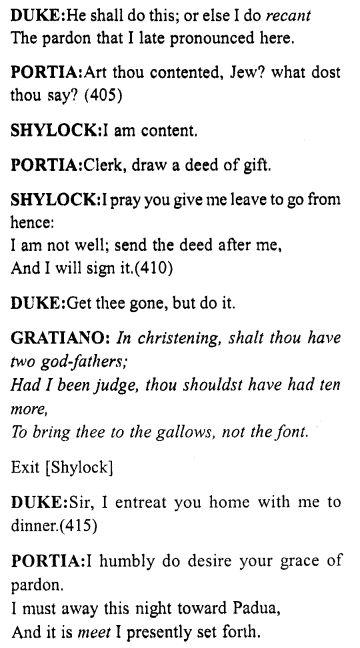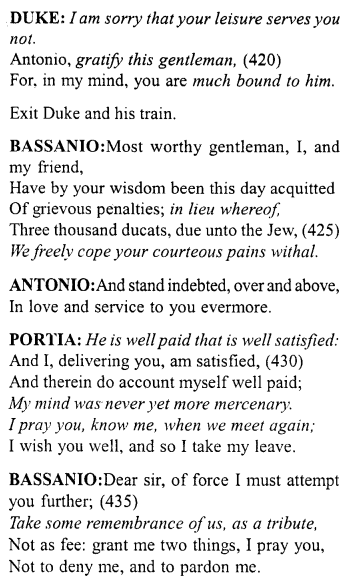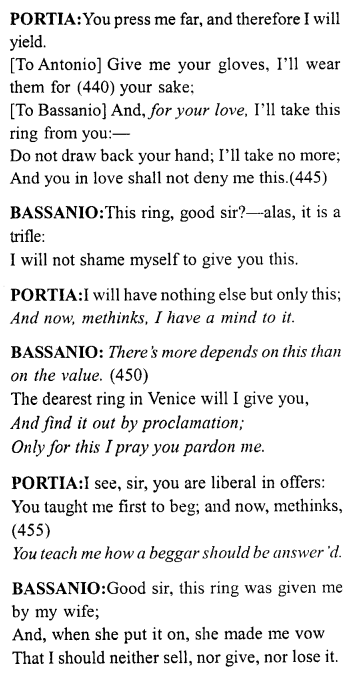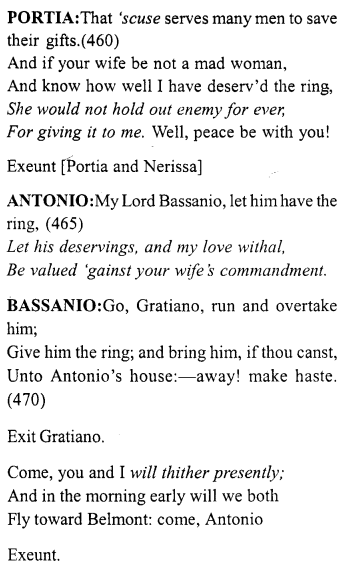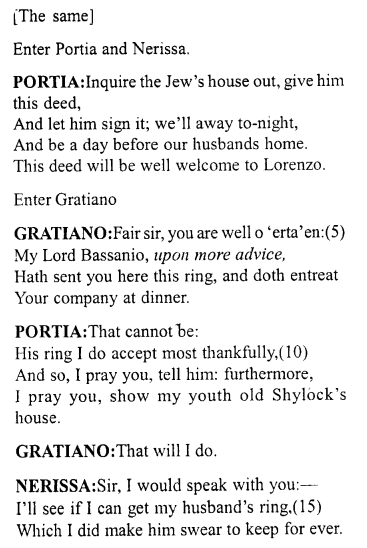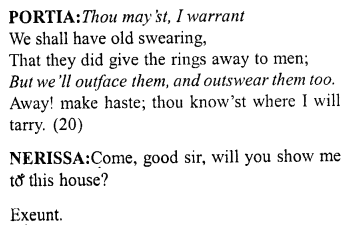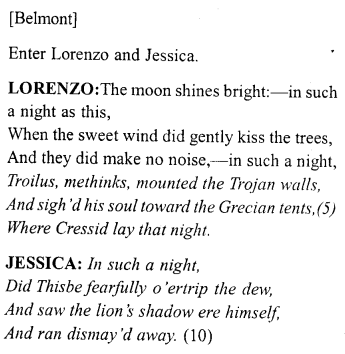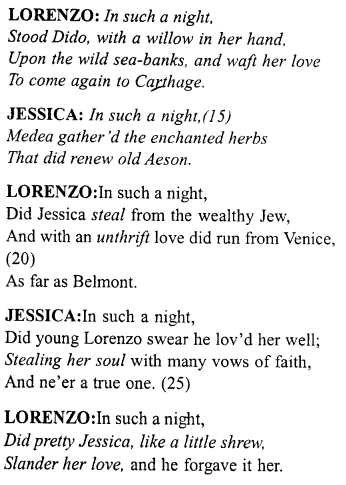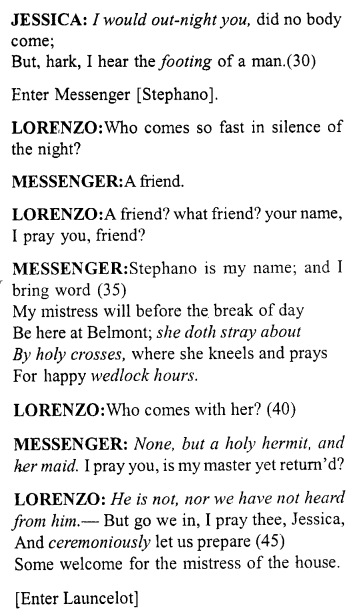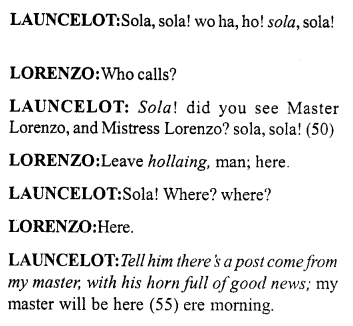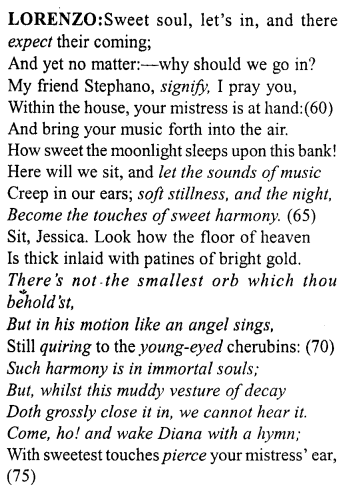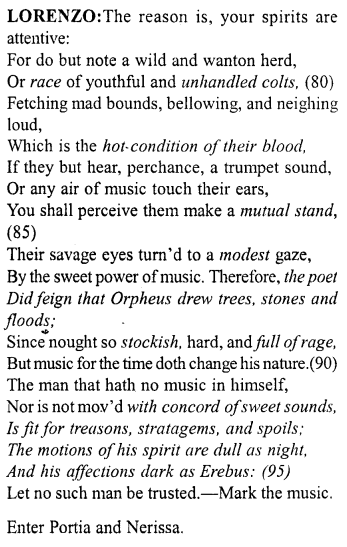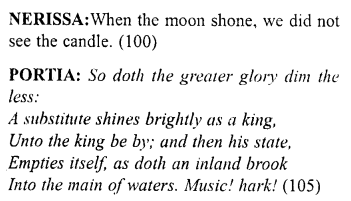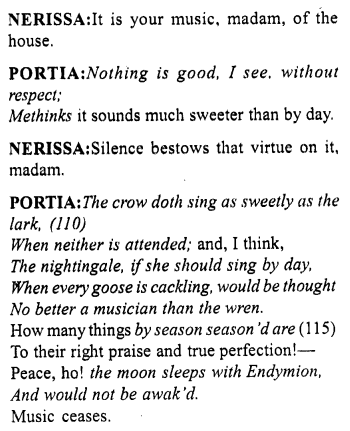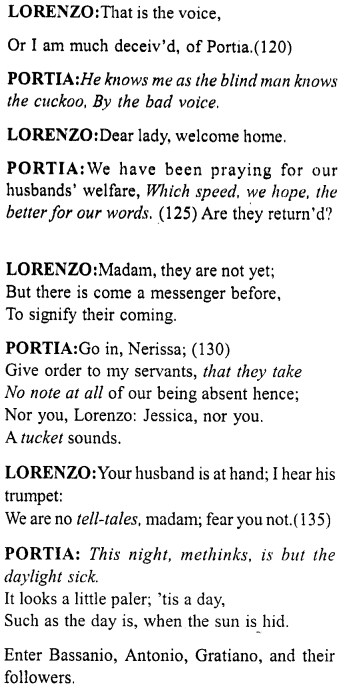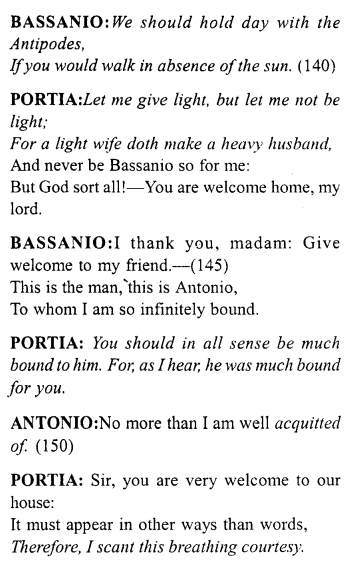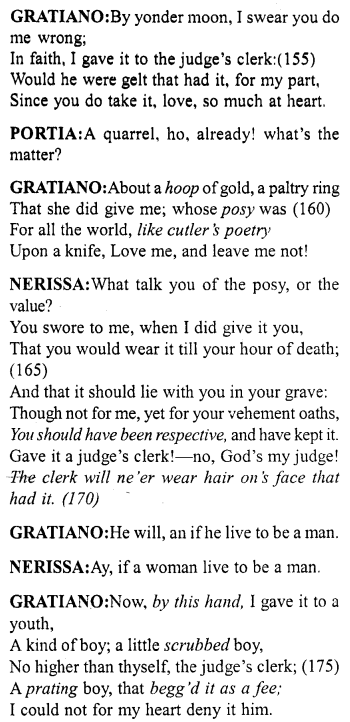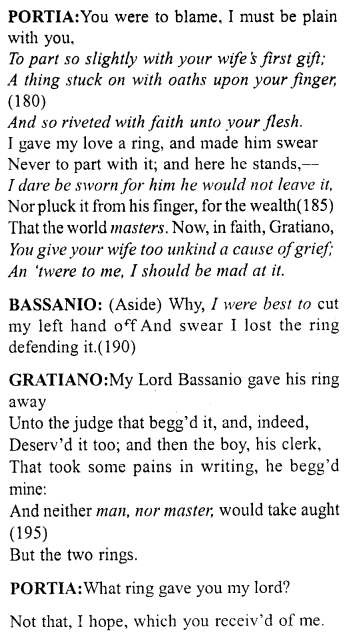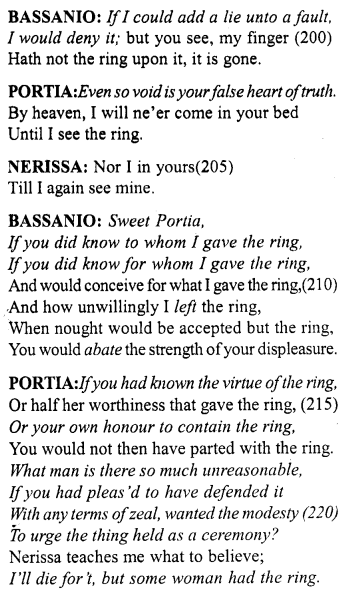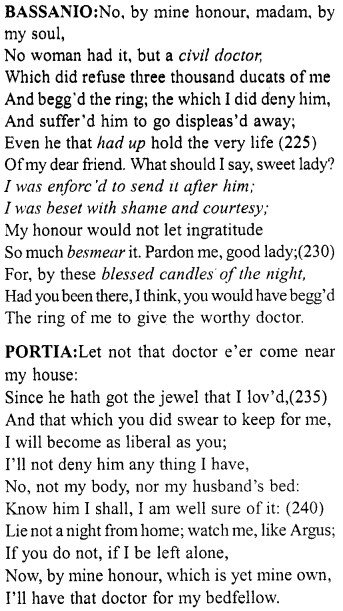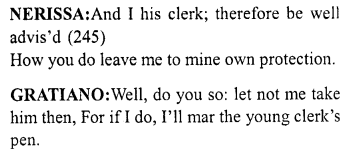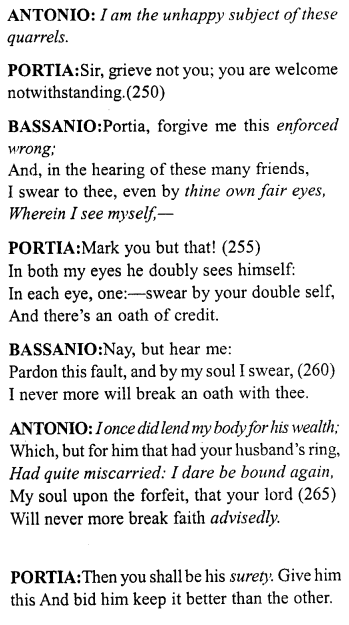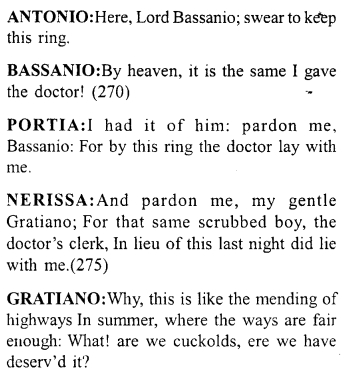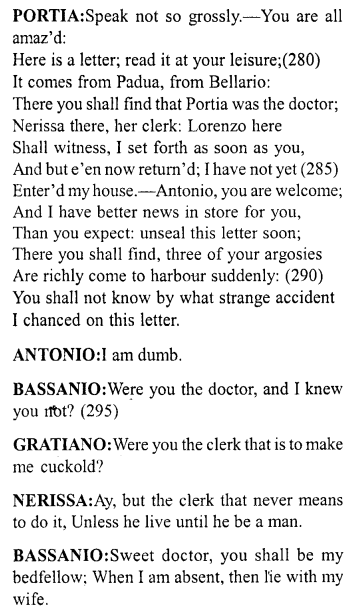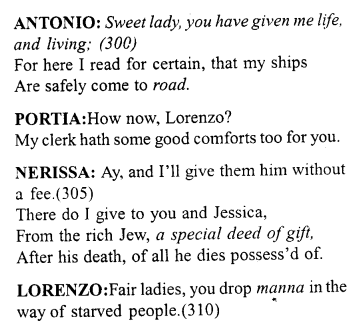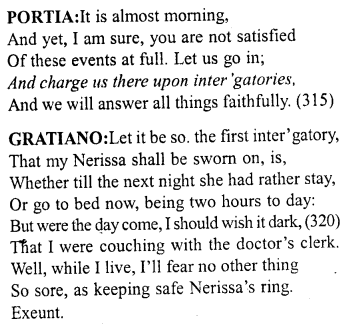Merchant of Venice Workbook Answers Act 4, Scene 1 – ICSE Class 10 & 9 English
ICSE SolutionsSelina ICSE SolutionsML Aggarwal Solutions
EnglishMathsPhysicsChemistryBiology
Passage – 1 (Act IV, Sc.I, Lines 16-34)
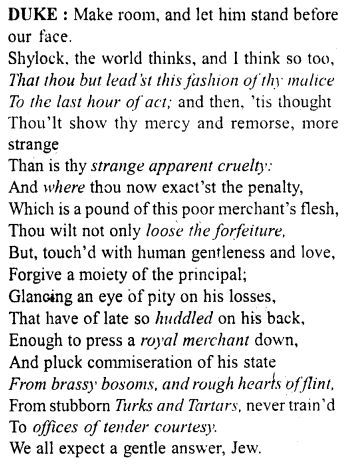
Paraphrase :
DUKE : Make room, and let him stand before us. Shylock, the world thinks, and I think so too, That you only carry this kind of malice To the very last hour of action; and then, it’s thought, You’ll show your mercy and remorse, more strangely Than your strange apparent cruelty is; And where you now exact the penalty,— Which is a pound of this poor merchant’s flesh, You will not only loose the default, But, touched with human gentleness and love, Forgive half of the borrowed amount, Glancing with an eye of pity on his losses, That have been so heaped on his back lately, Enough to press a royal merchant down, And get sympathy for his state From brassy bosoms and rough hearts of stone, From stubborn Turks and Tartars, never trained To uses of tender courtesy. We all expect a gentle answer, Jew.
Word Meaning With Annotation
That thou but lead’st this fashion of thy malice, To the last hour of act : that you only continue this cruel course up the last moment…. to relent then, strange apparent cruelty : this strange cruelty of yours, which I think only apparent or assumed . where : whereas, loose the forfeiture : excuse payment of the penalty, forgive a moiety : let him off from paying a certain part of the principal sum, huddled : accumulated; pressed upon, royal merchant : a very great merchant; a prince among merchants, from brassy bosoms, and rough hearts of flint : from hearts as pitiless as brass and as rough as stone. Turks and Tartars : in the vague and imperfect knowledge of Asiatic races which the Elizabethans possess, such people were looked upon as types of barbarians, offices of tender courtesy : obligations imposed by courtesy and kindness.
Read the above passage and answer the following questions
Question 1.
What do the Duke and the world expect Shylock to do?
Answer:
The Duke and the world expect that Shylock will show pity at the last moment when the time to cut off a pound of flesh would come.
Question 2.
How does to Duke expect Shylock to conduct himself in regard to the demand of a pound of flesh?
Answer:
The Duke thinks that Shylock will exempt Antonio from the penalty of a pound of flesh. He will also remit a part of the principal amount of the loan of three thousand ducats.
Question 3.
Why is Shylock expected to do so?
Answer:
Shylock is expected to do so because he will be touched with gentleness and love.
Question 4.
What kind of answer is expected from Shylock?
Answer:
A kind answer is expected from the Jew.
Question 5.
What is pressing the Royal Merchants?
Answer:
The heavy losses sustained by the Royal Merchant are pressing him.
Passage – 2 (Act IV, Sc.I, Lines 35-62)
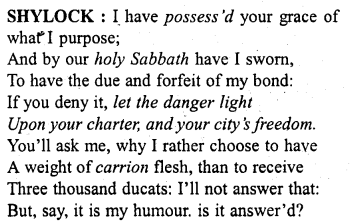
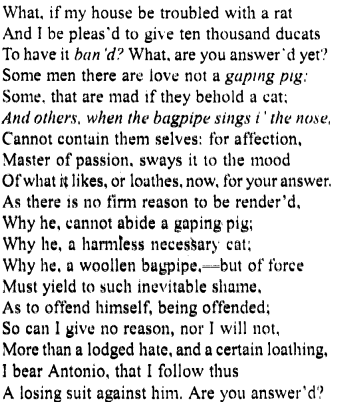
Paraphrase :
SHYLOCK : I have told your Grace of what I purpose, And, by our holy Sabbath, I have sworn To have the due and penalty of my promise to pay. If you deny it, let the danger light On your city charter and your city’s freedom. You ask me why I would rather choose to have A weight of dead flesh than to receive Three thousand ducats. I won’t answer that, Only to say I feel like it: have I answered you? What if a rat troubles my house, And I am happy to give ten thousand ducats To have it captured? What, aren’t you answered yet? There are some men that don’t love a dead pig; Some that are crazy if they see a cat; And others, when they hear the song of the bagpipe, Cannot hold their urine, because sympathy. Mistress of passion, persuades passion to the mood Of what it likes or hates. Now, for your answer; As there is no firm reason to be given, Why he can’t stand a dead pig ; Why he is afraid of a harmless, necessary cat; Why he wets himself when he hears a wailing bagpipe, Only that he must yield by force to such inevitable shame As to offend, himself being offended ; So I can give no reason, nor will I, More than I bear Antonio a deep-rooted hate and a certain intense dislike, That I follow a losing suit against him like this. Are you answered?
Word Meaning With Annotation
Posses’ d : informed; told, holy Sabbath : the sacred day of the week; Sunday, let the danger light, Upon your charter, and your city’s freedom : this is a threat to the Duke that some higher power may punish the city, if justice is refused to Shylock. carrion : dead; repulsive and unfit for food, ban’d: poisoned, gaping pig : sometimes a pig was prepared whole for the table, and set on a large dish with a lemon in its mouth. And other, when the bagpipe sings i’ the nose : many people with sensitive ears, do not like the wild notes of the bagpipe, which was probably known to Shakespeare as the national musical instrument of Scotland.
Read the above passage and answer the following questions
Question 1.
What information has Shylock given to the Duke?
Answer:
He has told the Duke that he would obtain the penalty which is due to him.
Question 2.
What, according to Shylock, will happen if he is denied the penalty of the bond?
Answer:
In that case the free rights and the freedom of the city of Venice will suffer.
Question 3.
What reason does Shylock give for insisting on having a pound of Antonio’s flesh?
Answer:
He does not give any reason. It is only a whim of his.
Question 4.
Why, according to Shylock, people like one thing and not the other?
Answer:
People like things according to their nature that produces emotions. It is actually the nature of a man which makes him like or dislike something.
Question 5.
What is the Shylock’s stack reason for pursuing a suit against Antonio?
Answer:
The reason is that he has deep hatred for Antonio.
Passage – 3 (Act IV, Sc.I, Lines 63-74)
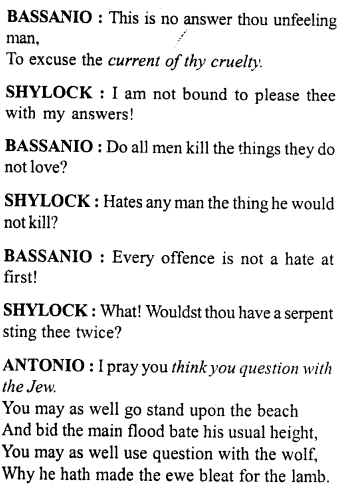
Paraphrase :
BASSANIO : This is no answer, you unfeeling man,To excuse the flowing of your cruelty.
SHYLOCK : I am not required to please you with my answer.
BASSANIO : Do all men kill the things they don’t love?
SHYLOCK : Does any man hate the thing he wouldn’t kill?
BASSANIO : Every wrong is not a hate at first.
SHYLOCK : What! Would you have a serpent sting you twice?
ANTONIO : Please, if you think you question the Jew: You may as well go stand on the beach, And ask the main ocean to decrease his usual height; You may as well use questions with the wolf, Why he has made the mother sheep cry for the lamb;
Word Meaning With Annotation
Current of the cruelty : cruel course of action, think you question with the Jew : Do you think you can argue with the Jew?
Read the above passage and answer the following questions
Question 1.
Where are the speakers at this time?
Answer:
The speakers are at this time in a court of law in Venice.
Question 2.
What answer had the “unfeeling man” given?
Answer:
The unfeeling man, namely Shy lock; had told the Duke that he was not prepared to forego the pound of flesh to which he was entitled as a consequence of Antonio’s failure to have repaid the loan within the prescribed period of time. Shylock had also said that he now wanted the pound of flesh, and not the money, because of his hatred of Antonio and his loathing for that man.
Question 3.
What light do these verbal exchanges throw on the characters of the speakers?
Answer:
Shylock here appears as a man of inflexible resolve, while Bassanio is trying his best to prevail upon Shylock to give up his resolve which is to cut off a pound of Antonio’s flesh. Bassanio pleads for a humane view of the situation, but Shylock hates Antonio so much that he compares that man to a serpent. Antonio, intervening in the conversation between Bassanio and Shylock, tells Bassanio that it is futile to argue with Shylock because Shylock is as merciless and savage as the wolf which kills and eats up a lamb. Thus Antonio knows what kind of a man Shylock basically is.
Question 4.
Whose arguments are here more convincing : Bassanio’s or Shylock’s?
Answer:
The arguments of both Bassanio and Shylock have considerable force. Bassanio pleads for mercy from Shylock, while Shylock depicts Antonio as a man who had dpne great damage to him financially and also in terms of reputation. However, Bassanio’s arguments are certainly more convincing because it is extreme of cruelty and savagery on the part of a man to try to take the life of another man, no matter what his grievances against the other man might be.
Question 5.
Comment on Antonio’s assessment of the Jew’s attitude.
Answer:
Antonio’s assessment of the Jew’s attitude is perfectly sound. Shylock has certainly suffered much at the hands of Antonio; but he is undoubtedly a man without any human feeling. Antonio rightly compares Shylock to a wolf who kills a lamb and eats it up to satisfy his hunger. And Antonio then rightly points out that it is as futile to try to alter the Jew’s attitude of cruelty as it would be to ask the pine trees on the mountains not to let their branches move at all when strong winds are blowing in the sky.
Passage – 4 (Act IV, Sc.I, Lines 70-80)
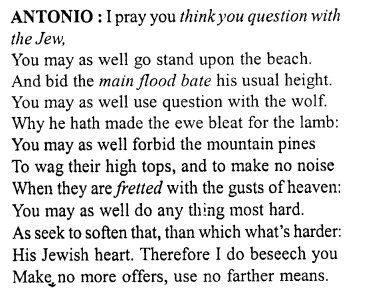
Paraphrase :
ANTONIO : Please, if you think you question the Jew: You may as well go stand on the beach, And ask the main ocean to decrease his usual height; You may as well use questions with the wolf, Why he has made the mother sheep cry for the lamb; You may as well forbid the mountain pines To wag their high tops and to make no noise When they are blown by the gusts of wind from the sky; You may as well do anything almost as hard As to seek to soften that—than what’s harder? His Jewish heart: so, I beg you, Make no more offers, use no farther means.
Word Meaning With Annotation
Think you question with the Jew : Do you think you can argue with the Jew? main flood : the tide, the ocean, bate : reduce, fretted : “agitated by”.
Read the above passage and answer the following questions
Question 1.
Who has been arguing with the Jew? What have been the bases of pleading by :
- The Duke
- Bassanio?
Answer:
In the trial scene, as the case comes for hearing, the duke makes an appeal to Shylock to drop his case against Antonio. This is followed by Bassanio’s request to the Jew to relent in his cruel attitude towards that helpless merchant.
- First, the duke makes a very well-worded appeal to Shylock asking him to show pity to Antonio who has suffered heavy losses in his ships. He tactfully tells the Jew that everybody thinks that Shylock is only putting up an appearance of malice against Antonio. At last, he will show mercy by not only giving up the demand for Antonio’s punishment but also by forgiving a part of the principal amount of the loan. But Shylock claims that he has taken an oath to punish Antonio. So he cannot change his mind.
Shylock refuses to explain why he is so cruel in his demand of a pound of flesh from Antonio’s body. He gives many examples to prove that men hate certain things and cannot tolerate them. Similarly, he cannot tolerate Antonio. So he must exert his penalty. If the duke refuses to give him his legal due, it will bring a bad name to the rule of law in Venice. - As for Bassanio, Shylock dismisses him even more rudely. When Bassanio asks the Jew why he is giving such unreasonable answers, the Jew retorts that he is not bound to please him with his answer. When Bassanio asks if all men kill the things they do not like. Shylock wants to know if he should allow a snake to bite him twice. Thus, Bassanio’s pleading makes the Jew even more angry.
Question 2.
Were they able to convince the Jew? What was the Jew’s main answer?
Answer:
Both the duke and Bassanio failed to convince the Jew to have mercy on Antonio. Shylock’s main answer was that it was settled hate and a strong loathing for Antonio that he was pursuing a suit which involved a financial loss to him.
Question 3.
What does Antonio now say? Does he approve of any more pleading with the Jew?
Answer:
Antonio knows enough about Shylock’s obduracy and revengeful spirit. So he realises that arguing with the Jew is futile. The suspense of the trial is unbearable to him, and he prefers to hear the verdict.
Question 4.
Explain the following
- making “the ewe bleat for the lamb”.
- forbidding “the mountain pines’ To wag their high tops.”
- “bid the main flood bate his usual height”
Answer:
Antonio makes several comparisons to explain the stubbornness of the Jew. It is futile to argue with him.
- it is as futile as arguing with the wolf and asking him why he has devoured the lamb and thus
made the mother- sheep cry in distress. - It is as futile as ordering the pine-trees growing on the mountain-tops not to shake their top most branches and not produce any sound when they-are agitated by the assaults made by the winds blowing over them.
- It is as futile as going and standing on the sea-shore and calling upon the high tide to remain lower than its usual level.
Question 5.
Does Antonio speak in a mood of calm resignation? Is he afraid of consequences?
Answer:
Antonio speaks in a mood of philosophic resignation. He does not seem to be afraid of the consequences. He is ready to hear the judgement to let the Jew have what he wants. He knows that the Jew’s revenge is volcanic and sweeping in its motion and range. He, therefore, resigns before his fate.
Passage – 5 (Act IV, Sc.I, Lines 88-103)
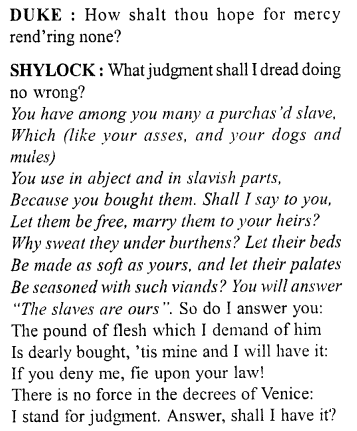
Paraphrase :
DUKE : How shall you hope for mercy, giving none?
SHYLOCK : What judgment shall I dread, if I have done no wrong? You have many purchased slaves among you,Which, like your asses and your dogs and mules,You use in low and in slavish ways, Because you bought them; shall I say to you” Let them be free, damn them to your heirs?” Why do they sweat under burdens? Let their beds Be made as soft as yours, and let their palates Be seasoned with such rich meats? You will answer”The slaves are ours.” So I answer you: The pound of flesh which I demand of him Is dearly bought; it’s mine, and I will have it.If you deny me, damn your law! There is no backbone in the laws of Venice. I stand for judgment: answer; shall I have it?
Word Meaning With Annotation
You have among you many a purchas’d slave, Which (like your asses, and your dogs and mules) You use in abject and in slavish parts, Because you bought them. Shall I say to you, Let them be free, marry them to your heirs?, Why sweat they under burthens? Let their beds, Be made as soft as yours, and let their palates, Be seasoned with such viands? You will answer, “The slaves are ours” : Shylock argues that it is a common practice to keep slaves, and many in the court do so. The slaves are regarded as the property of the owner, and may be treated in any manner. Similarly this pound of flesh is his own property, and he may do what he likes with it without being brought to account. This passage shows well the unyielding and determined nature of Shylock, as well as the cruelty of his nature, parts : duties.
Read the above passage and answer the following questions
Question 1.
Where are the speakers at this time?
Answer:
The speakers are at this time in a court of law m Venice.
Question 2.
On what basis does Shylock say that the pound of flesh being demanded by him is his, and that he will have it?
Answer:
Shylock makes a claim to a pound of Antonio’s flesh on the basis of the bond which Antonio had signed and which Antonio has forfeited.
Question 3.
Why does Shylock say that the pound of flesh “is dearly bought”?
Answer:
Shylock had given Antonio a loan of three thousand ducats which Antonio has failed to repay within the prescribed period of time. As Antonio has forfeited the bond which he had signed, Shylock is now entitled to a pound of Antonio’s flesh. In other words, having lost an amount of three thousand ducats, Shylock can demand a pound of Antonio’s flesh as the penalty specified in the bond. Three thousand ducats is a large amount of money; and therefore Shylock says that he has paid a heavy price for the pound of flesh which he is demanding. He would not now accept any amount of money in lieu of the flesh to which he is entitled; and so the price, which he is now paying for that flesh, is even higher than before because Bassanio is now willing to pay the Jew any amount of money in order to save Antonio.
Question 4.
What answer does the Duke give to Shylock’s question?
Answer:
Shylock’s question is whether or not the Duke is willing to enforce the law and let him cut off a pound of Antonio’s flesh. To this question, the Duke replies that he would use his authority to dismiss the court and to resume the proceedings only when a learned doctor of laws by the name of Bellario arrives here. The Duke says that he has sent for that learned lawyer to decide Shylock’s claim against Antonio.
Question 5.
To what extent does Shylock’s comparison of the pound of flesh with asses, dogs, and mules seem to you to be appropriate?
Answer:
Shylock’s comparison of a pound of Antonio’s flesh with asses, dogs, and mules owned by the Duke and by other persons in Venice is perfectly sound. The owners of asses, dogs and mules have full authority over their animals, and have a right to use them for any purpose they like. Shylock, having become legally entitled to cut off a pound of Antonio’s flesh, has now acquired similar authority over that flesh. The owners of those animals had paid a price to buy them and then to use them to carry goods from one place to another or for any other purpose, according to their requirements. Shylock too had purchased a pound of Antonio’s flesh at a certain price. He had given Antonio an amount of three thousand ducats which he had not got back; and, therefore, according to the terms of the bond, he has acquired a right over a pound of Antonio’s flesh which he can then use in any way he likes.
Passage – 6 (Act IV, Se.I, Lines 111-118)
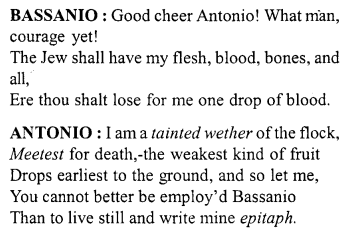
Paraphrase :
BASSANIO : Cheer up, Antonio! What, man, have courage still! The Jew shall have my flesh, blood, bones, and everything, Before you shall lose one drop of blood for me.
ANTONIO : I am a poisoned, castrated ram of the flock, Most ready for death; the weakest kind of fruit Drops first to the ground, and so let me.You cannot be better employed, Bassanio,Than to live on, and write my epitaph.
Word Meaning With Annotation
Tainted wether : an old and infirm sheep, meetest : fittest, epitaph : inscription on a tirnb stone
Read the above passage and answer the following questions
Question 1.
Where are the speakers at this time?
Answer:
The speakers are at this time in a court of law in Venice.
Question 2.
Under what circumstances does this dialogue take place?
Answer:
This dialogue takes place when Shylock’s case against Antonio seems to be going against Antonio. The Duke’s personal appeal to Shylock has produced no effect on Shylock; and Bassanio’s pleading with Shylock has also failed to serve any purpose.
Question 3.
Do you think that Bassanio is sincere in giving the assurance which he gives to Antonio in his speech?
Answer:
Bassanio is certainly sincere in giving Antonio the assurance that he would not allow the Jew to cut off any flesh from Antonio’s body, no matter what sacrifice he (Bassanio) might have to make. Bassanio is willing to give the Jew his own flesh, blood, bones, and every other part or organ of his body to save Antonio’s life. It is another matter that Shylock would not accept any such offer from Bassanio; but Bassanio is quite sincere in making the offer. Of course, Bassanio’s offer is made in a rhetorical manner and cannot be taken literally, but his sincerity towards Antonio cannot by doubted.
Question 4.
Why is Antonio willing to die?
Answer:
Antonio thinks himself to be a useless man now when he has become a bankrupt, and has completely lost his flourishing business. He compares himself to a sheep which becomes infected with some disease dangerous to the other sheep as well. It would be better if an infected sheep, and the continued presence of which in a flock of sheep can prove dangerous to the other sheep as well. It would be better if an infected sheep dies than that it should infect the other sheep as well. In the same way, Antonio would like to die instead of continuing to live and cause endless anxiety to his friends like Bassanio.
Question 5.
Explain the following expressions:
(a) a tainted wether of the flock
(b) Meetest for death
(c) and write mine epitaph
Answer:
(a) A tainted wether of the flock- an infected male sheep of a flock of sheep; a sheep which has caught some disease and which is likely to infect the other sheep as well, by its contact with the others. Actually the word “wether” means a male sheep which has been castrated and thus rendered incapable of impregnating the female sheep.
(b) Meetest for death- most fit to die. The word “meet” in this sense means “proper” or “appropriate”. “Meetest” is the superlative degree of the word “meet” which is here an adjective. “Meetest” therefore means “most proper” or “most appropriate”.
(c) And write mine epitaph- and compose the epitaph to be inscribed on my tomb. “Epitaph” means the words (in prose or in verse) which are inscribed on a tombstone. An epitaph is generally a tribute paid to a dead man or woman by his or her relatives or admirers.
Question 6.
What feelings does this piece of dialogue arouse in your heart?
Answer:
This piece of dialogue arouses our sympathy for Antonio and our admiration for Bassanio. We are filled with deep pity at the fate which Antonio is on the verge of meeting; and we certainly admire Bassanio for his sincerity towards his friend who is in deep trouble.
Passage – 7 (Act IV, Sc.I, Lines 121-133)
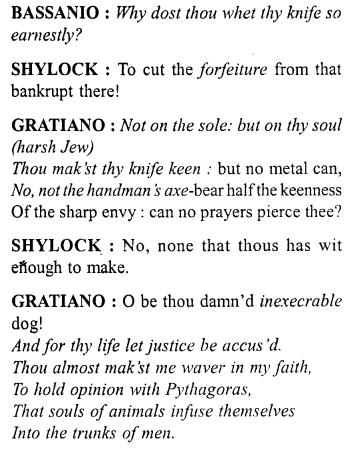
Paraphrase :
BASSANIO : Why do you sharpen your knife so earnestly?
SHYLOCK : To cut the default from that bankrupt there.
GRATIANO : You make your knife sharp, not on the sole of your shoe, But on your soul, harsh Jew, but no metal can, No, not the hangman’s axe, be sharpened to half the sharpness of your sharp hate. Can any prayers get through to you?
SHYLOCK : No, none that you have sense enough to make.
GRATIANO : Oh, damn you, stubborn dog! And, for your life, let justice be blamed. You almost make me change my mind, About agreeing with Pythagoras That the souls of animals send themselves into the bodies of men.
Word Meaning With Annotation
Why dost thou whet thy knife so earnestly : at this stage of the play, the actor who plays the part of Shylock bends down and proceeds to sharpen the edge of his knife upon the leather sole of his shoe, forfeiture : that which has been forfeited, or the flesh, not on the sole: but on thy soul (harsh Jew), Thou mak’st thy knife keen : the Old English word for soul was sawol. While the spelling had changed by the time of Shakespeare it is possible that it was pronounced rather like “sowl”, to rhyme with “howl.” no, not the hand man’s axe : the official who executed condemned men was called the “hangman”. Low bon criminals or men charged with ordinary offences were executed by hanging. But noble or political prisoners would be beheaded with an axe, manipulated by the same hangman, inexorable : ‘inexecrable’ “too bad for execration.” and for thy life let justice be accus’d : and we must accuse the spirit of Justice for allowing you to live, thou almost mak’st me waver in my faith, To hold opinion with Pythagoras, That souls of animals infuse themselves, Into the trunks of men : Pythagoras was a Greek philosopher who believed that souls of men or animals appeared several times on the earth, assuming sometimes higher and sometimes lower forms of life.
Read the above passage and answer the following questions
Question 1.
Where are the speakers at this time?
Answer:
The speakers are at this time in a court of law in Venice.
Question 2.
What is the difference between “sole” and “soul” as used by Gratiano? In what sense has the word “keen” been used?
Answer:
The word “sole” means the bottom side of a shoe, and the word “souel” means the spirit of a man. A sole is made of leather (and, in some causes, of rubber), while a soul is the spirit which dwells inside a body and which is immortal. The words “sole” and “soul” have an identical pronunciation though they have different meanings. Thus we have a pun here. The word “keen” as used here means “sharp.”
Question 3.
In what way is Shylock making his knife keen on his soul?
Answer:
Gratiano means to say that Shylock’s knife has been made sharp by the cruelty of his spirit, and not as a result of his rubbing the knife against the leather sole of a shoe.
Question 4.
Explain the line : “And for thy life let justice be accus’d”.
Answer:
Justice itself would deserve to be condemned and denounced if it allows a revengeful and savage man like Shylock to continue to live in this world. Gratiano means to say that the law should take ‘‘cognizance of Shylock’s inhumanity and savagery, and should condemn him to death instead of allowing him to cut off another man’s flesh and killing the other man.
Question 5.
Who was Pythagoras?
Answer:
Pythagoras was an ancient Greek Philosopher who believed in the transmigration of the soul. According to him, the soul of a man might, after his death, enter the body of an animal, and vice versa. (That is the belief that many Hindus also hold even in these scientific times).
Passage – 8 (Act IV Sc.I, Lines 128-140)
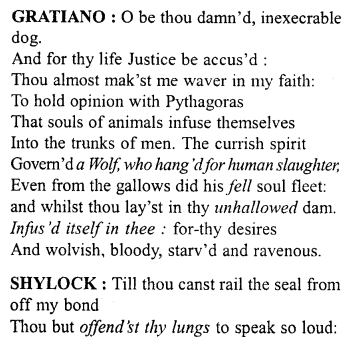
Paraphrase :
GRATIANO : Oh, damn you, stubborn dog! And, for your life, let justice be blamed. You almost make me change my mind, About agreeing with Pythagoras That the souls of animals send themselves Into the bodies of men. Your dog-like spirit That must have been ruled by a wolf Hanged for killing a human, his evil soul Falling quickly even from the gallows, And, while you lay in your unholy mother, Sent itself into you, because your desires Are wolfish, bloody, starved, and hungry.
SHYLOCK : Until you can scream the seal from off my promise to pay, You only insult your lungs to speak so loud.
Word Meaning With Annotation
A Wolf, who hang’d for human slaughter : In the olden days it was not uncommon for animals to be formally executed like criminals, fell : fierce; cruel, unhallowed : wicked; vile, infus’d itself in thee : poured itself into the body, offend’st thy lungs : injure your lungs; put them to useless labour.
Read the above passage and answer the following questions
Question 1.
Why does Gratiano use an abusive language for Shylock? What has exactly provoked him so much?
Answer:
All appeals to Shylock to have mercy on Antonio, have failed. The Jew is bent upon inflicting penalty on his enemy by cutting off a pound of flesh from his body. Gratiano reminds Shylock that he is bringing damnation to his soul by persisting in his blood-thirsty course.
When Gratiano asks Shylock if any prayers can influence the Jew, Shylock curtly answers that no words can soften his heart. In sheer desperation, Gratiano bursts into a language of abuse. He calls Shylock a merciless dog.
Question 2.
Why does Gratiano blame justice?
Answer:
Gratiano blames justice for allowing a person like Shylock to live and enjoy human rights. This blood-thirsty fellow is less like a human being and more like a beast.
Question 3.
What makes him “waver” in his faith? What is his faith?
Answer:
Gratiano is a Christian, but on seeing a man like Shylock, his faith in Christianity is shaken. He begins to believe in the doctrine of the ancient Greek philosopher, Pythagoras. This doctrine is known as the doctrine of transmigration of souls.This meant that the souls of animals often entered the bodies of men.
Question 4.
In what respect does he seem to agree with Phytha- goras?’
Answer:
Accounting thus for Shylock’s behaviour, Gratiano says his spirit was earlier in a wolf who was hanged for killing human beings. Then this spirit fled from the body of wolf, and entered Shylock’s mother’s womb. This is the reason that Shylock has his insatiable wolfish desires. In this respect Gratiano seems to agree with Phythagoras.
Question 5.
How does Shylock respond to Gratiano’s outburst?
Answer:
Shylock responds to Gratiano’s angry outburst in a calm and assured manner. He knows the futility of all curses uttered against him. So long as Gratiano’s curses cannot erase Antonio’s seal from his bond, he (Gratiano) is only injuring his lungs to curse the Jew so loudly.
In a malevolently patronising attitude, Shylock advises Gratiano to look to his wit or it will be ruined past all repair. Shylock stands for law, and abusing or cursing him is altogether foolish.
Passage – 9 (Act IV Sc. I Lines 182 to 203)
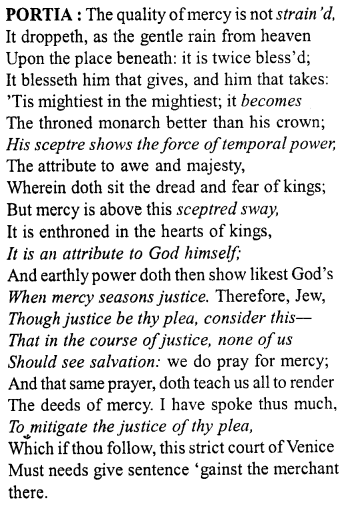
Paraphrase :
PORTIA : The quality of mercy is not restricted; It drops as the gentle rain from heaven On the place beneath the clouds. It is twice blessed : It blesses him that gives mercy and him that takes mercy. It’s most powerful in’ the most powerful people; it suits The throned king better than his crown; His royal wand shows the force of earthly power, The quality to amaze and rule, Where the dread and fear of kings sits; But mercy is above the wave of this wand, It sits on a throne in the hearts of kings, It is a quality of God himself; And earthly power then shows itself like God’s When mercy goes with justice. So, Jew, Though justice is your plea, consider this, That if we all got justice, none of us Would see salvation; we pray for mercy, And that same prayer teaches us all to do The deeds of mercy. I have spoken this much To soften the justice of your plea, Which if you follow, this strict court of Venice Must give a ruling against the merchant there.
Word Meaning With Annotation
Strain’d : forced; compelled, becomes : adorns; renders beautiful, his sceptre shows the force of temporal power : his sceptre is the emblem of worldly power, temporal means, in this sense, “worldly” as opposed to “heavenly.” Read “wordly power which attracts feelings of awe and respect for his majesty, and caused the dread and fear with which men think of kings.” “dread” and “fear” did not signify terror, but rather “deep veneration.” sceptred sway : the worldly rule which is symbolised by the sceptre, it is an attribute to God himself : it is a divine quality, and one which God Himself possesses, when mercy seasons justice : when mercy lessens the severity of justice, though justice be thy plea, consider this, That in the course of justice, none of us, Should see salvation : this is a statement of the Christian doctrine that we are all sinners, and therefore must throw ourselves on God’s mercy. If we were judged with strict justice, not one of us would deserve heavenly happiness, to mitigate the justice of thy plea : to persuade you to put forward a milder demand than that for strict justice.
Read the above passage and answer the following questions
Question 1.
What does she mean by saying that the quality of mercy is not strain’d?
Answer:
It means that mercy cannot be shown under compulsion.
Question 2.
How can the flow of mercy be described?
Answer:
The flow of mercy is as natural and spontaneous as the drops of rain falling from the sky on the earth.
Question 3.
How does mercy confer a double blessing?
Answer:
Mercy is a blessing for him who receives. It is also a blessing for him who shows mercy. Thus it is a double blessing.
Question 4.
When does an earthy power conduct itself like God?
Answer:
An earthly power acts like God when it seasons justice with mercy.
Question 5.
Why according to Portia, should we do deeds of mercy?
Answer:
We pray to God for mercy. That prayer teaches us to perform merciful acts. To deserve God’s mercy, we should show mercy to others
Passage – 10 (Act IV, Sc.I, Lines 207-220)
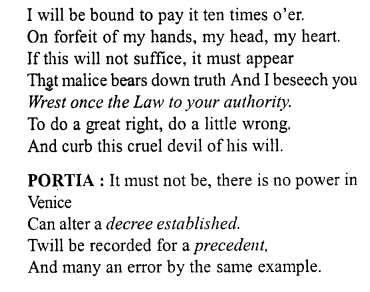

Paraphrase :
I’ll swear to pay it ten times over On penalty of the loss of my hands, my head, my heart; If this is not enough, it must seem That evil wins over truth. And, I beg you, Twist the law once to your authority; To do a great right, do a little wrong, And deprive this cruel devil of his will.
PORTIA : It must not be; there is no power in Venice that can change an established law; It will set a precedent, And many errors by the same example Will rush into the state. It cannot be.
SHYLOCK : A prophet from the Bible come to judgment! Yes, a prophet! Oh, wise young judge, how I honour you!
Word Meaning With Annotation
Wrest once the Law to your authority : for one occasion, use your authority to change the course of the law. decree established : a law which is fixed and on the statute book, precedent : an example which might be followed by other judges, will rush into the state : will speedily appear in the business of the State, a Daniel come to judgement, yea a Daniel : Daniel, one of the great Jewish characters of the Old Testament, was a man famed for wisdom and sound judgment. Shylock takes his name here as a representative or type of the perfect judge.
Read the above passage and answer the following questions
Question 1.
Who will be bound to pay it ten times? What is the original sum? Why does the speaker offer to pay ten times?
Answer:
It is the trial scene of the play, “The Merchant of Venice”. Shylock has taken the stand that he wants the forfeiture of the bond. All appeals to him to take mercy on Antonio, have failed. Portia appears in the duke’s court as the young lawyer. She finds the case quite clear. She also tries to appeal to the good sense in Shylock, but all in vain. Then she asks if Antonio cannot make the payment. At once, Bassanio offers to make the payment on behalf of his friend. He offers to make twice the principal. If that is not acceptable, he is ready to make ten times that sum. The original sum is three thousand ducats. Bassanio offers ten times this sum in order to tempt Shylock to accept, the money and spare Antonio’s life.
Question 2.
What else does the speaker offer? Why he make such an offer?
Answer:
Bassanio knows that his dear friend’s life is in danger. He is ready to do anything to save him. He, therefore, assures Shylock that if he fails to pay ten times the sum, he will forfeit his hands, his head and his heart. In short, Bassanio mortgages his own life if that can satisfy the Jew.
Question 3.
Explain what argument is given to say that “malice bears down truth”?
Answer:
Bassanio says that if Shylock is not prepared to accept even times what he lent, it must be apparent that his malice is defeating all sense of fairness. Shylock is then interested more in satisfying-his malice than in getting justice.
Question 4.
What is ultimately suggested by the Bassanio?
Answer:
Bassanio suggests that in these extraordinary circumstances the law for once may be made inoperative. He argues that a little wrong, i.e. suspending the operation of the law, may be allowed to do a great right, i.e. saving Antonio’s life. By doing this, it will be possible to prevent the devilish Jew from getting what he wishes to have, i.e. a pound of Antonio’s flesh.
Bassanio implores the judge to twist the law a little in order to save the life of an honest man like Antonio. Shylock could not be prevented from mischief by following a strictly legal procedure.
Question 5.
What is Portia’s opinion on the question of Venetian law?
Answer:
Portia rejects Bassanio’s suggestion. She asserts that there is no power in Venice which change law. It will set a bad precedent and this example will be quoted in future to do wrong things. If this is allowed, other mistakes will find their way into the administration of the state.
Question 6.
How does Shylock respond to Portia’s interpretation of law?
Answer:
Shylock is delighted to Portia’s argument while rejecting Bassanio’s appeal to interfere with law. He thinks that Portia is pleading in such a manner that he must win the case. So he praises her skill and sense of justice. Shylock compares Portia with Daniel, a young Jewish prophet who in case had exposed the falsity of certain witnesses by cleverly cross-examining them.
Passage – 11 (Act IV, Sc.I, Lines 223-241)
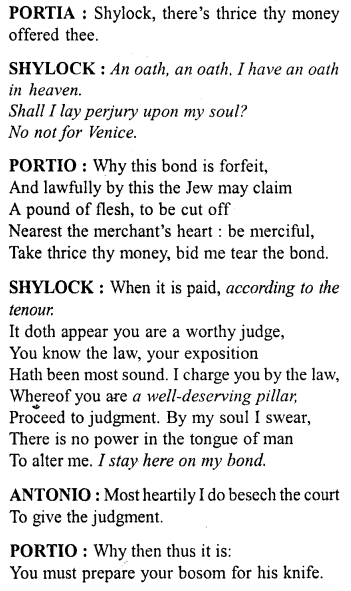
Paraphrase :
PORTIA : Shylock, there’s three times your money offered to you.
SHYLOCK : An oath, an oath! I have an oath in heaven. Shall I lay perjury on my soul? No, not for Venice.
PORTIA : Why, this promise to pay is penalty; And lawfully the Jew may claim A pound of flesh by this, to be by him cut off Nearest the merchant’s heart. Be merciful.Take three times your money; ask me to tear up the promise ta pay.
SHYLOCK : When it is paid according to the terms. It appears you are a worthy judge;You know the law; your explanation Has been most sound; I charge you by the law, Of which you are a well-deserving upholder, Proceed to judgment. By my soul, I swear There is no power in the voice of man To change my mind. I wait here on my promise to pay.
ANTONIO : Most heartily I beg the court To give the judgment.
PORTIA : Why then, it is like this:You must prepare your chest for his knife.
Word Meaning With Annotation
An oath, an oath, I have an oath in heaven. Shall I lay perjury upon my soul? No not for Venice : Shylock gives us an additional reason that he has sworn a sacred oath (in the Jewish synagogue) not to be dissuaded from exacting what is due under the bond. This oath he cannot break, without committing a serious sin against his religion, according to the tenour : according to the strict wording and meaning, a well deserving pillar : “a worthy representative.” Shylock says that Portia is an equally strong supporter of the structure of the law. I stay here on my bond : I base my claim strictly on my bond.
Read the above passage and answer the following questions
Question 1.
Where are the speakers at this time?
Answer:
The speakers are at this time in a court of law in Venice.
Question 2.
Why does Shylock refuse an offer of money?
Answer:
Shylock refuses the offer of money because he wants to put an end to the life of a man whom he regards as his enemy and whom he hates fiercely.
Question 3.
What makes Portio say: be merciful, Take thrice thy money, bid me tear the bond.
Answer:
Portia in these words makes a two fold appeal to Shylock. Originally she had suggested that Shylock should accept the money and spare Antonio’s flesh. She had then appealed to Shylock to show mercy to Antonio and spare his life. Now she combines both those appeals into one. She first asks him to show mercy and then, in the same breath, she appeals to his greed, suggesting that he should accept three times the amount which he had given to Antonio as a loan. Thus she tries her utmost to induce Shylock to soften or relent. She would like to put an end to the dispute in this way, and to tear the bond on the basis of which Shylock is demanding a pound of Antonio’s flesh in order to kill him.
Question 4.
Why does Antonio beseech the court to proceed to judgment instead or wanting the judgment to be delayed?
Answer:
Antonio is feeling impatient because Shylock has refused to budge from his position in spite of many appeals which have been made to him. Antonio does not want that any more appeals should be made to the Jew because he knows that the Jew is not going to relent. He sees no point in the proceedings of the court being prolonged because he feels certain that no purpose would be served by delaying them. Being a serious-minded and stoical kind of man, he wants that the proceedings should be expedited, and the judgment be delivered without any further appeals being made to the Jew.
Question 5.
What causes a turn in the course of events as depicted here?
Answer:
The turn in the events is caused by Portia’s sudden announcement that the Jew can have a pound of Antonio’s flesh but that the Jew must not shed a single drop of Antonio’s blood in the course of his cutting off the flesh.
Passage – 12 (Act IV Sc. I Lines 260 to 277)
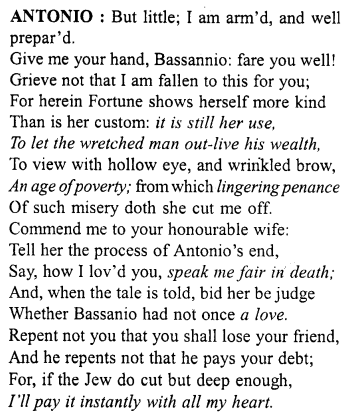
Paraphrase :
ANTONIO : Only little: I am ready and well prepared. Give me your hand, Bassanio: goodbye! Don’t grieve that I am doing this for you, Because here Fortune shows herself more kind Than is her habit: it is still her habit To let the wretched man outlive his wealth, To view an age of poverty with hollow eye and wrinkled brow; She cuts me off from the lingering repentance Of such misery. Commend me to your honorable wife: Tell her the story of Antonio’s end; Say how I loved you; speak fairly about me in death; And, when the tale is told, ask her to be the judge of Whether Bassanio didn’t once have a love. Only be sorry that you shall lose your friend, And he is not sorry that he pays your debt; Because if the Jew only cuts deep enough, I’ll pay it instantly with all my heart.
Word Meaning With Annotation
It is still her use, to let the wretched man out-live his wealth : fortune often ruins a man, and allows him to live on in miserable poverty after his wealth has gone, but she is more kind to Antonio in mercifully allowing him to die at the same time, an age of poverty : the prospect of spending his old age in poverty, lingering penance : prolonged suffering, speak me fair in death : speak well of me to her after I am dead, a love : a friend who felt deep love. I’ll pay it instantly with all my heart : even in the moment of tragedy, Shakespeare makes Antonio speak with grim humour, using the double meaning which characterised the wit of the day. “With all my heart” means in the first place, “With the utmost willingness.” But there is the literal meaning that the Jew would cut out the whole of Antonio’s heart as part of the pound of flesh. This is a tense moment, but it is relieved by this humorous remark. The courageous character of Antonio and his frank manliness make a sharp contrast with the malice of the Jew.
Read the above passage and answer the following questions
Question 1.
Who is the speaker of these lines?
Answer:
Antonio is the speaker of these lines.
Question 2.
What is the state of the speaker’s mind?
Answer:
He is fully prepared for his death.
Question 3.
Why does the speaker think that fortune is kinder to him?
Answer:
He thinks fate is kinder to him because it is always the customs of fate to let the wretched man live even when he is absolutely penniless. He is being allowed by fate to die. Thus he would not live a life of poverty.
Question 4.
What does Antonio want Bassanio to do?
Answer:
Antonio wants Bassanio to convey his greetings to his (Bassanio’s) honourable wife. He also wants him to tell her the manner of his death.
Question 5.
What does the Antonio expect Bassanio’s wife to judge?
Answer:
He wants her to judge whether Bassanio did not at one time have a sincere friend.
Passage – 13 (Act IV, Sc.I, Lines 288-299)
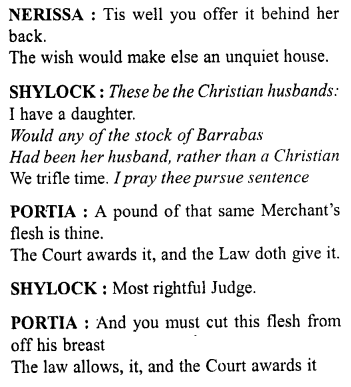
Paraphrase :
NERISSA : It’s well you offer it behind her back; The wish would other make a noisy house.
SHYLOCK : These are the Christian husbands! I have a daughter; would any of the stock of Barabbas the thief had been her husband, rather than a Christian! We are wasting time; Please, enforce sentence.
PORTIA : A pound of that same merchant’s flesh is yours. The court awards it and the law gives it.
SHYLOCK : Most rightful judge!
PORTIA : And you must cut this flesh from off his breast. The law allows it and the court awards it.
Word Meaning With Annotation
Thpse be the Christian husbands : to Shylock, the words of Bassanio and Gratiano appear unnatural, and he infers “That shows how little Christian husbands think of their wives.” would any of the stock of Barrabas, Had been her husband, rather than a Christian : Barabbas was a murderer in the Bible, and murder is a crime which is particularly rare and greatly abhorred among the Jews. Yet Shylock says that he would have preferred to see Jessica married to a descendant of Barabbas, rather than a Christian. I pray thee pursue sentence : Carry out the sentence, please!
Read the above passage and answer the following questions
Question 1.
Who is ‘you’ referred by Nerissa in the first line of extract? What is the offer made and why would it make an unquiet house?
Answer:
The person referred to as ‘you’ is Gratiano. He has made an offer that is likely to make an unquiet house. He has declared that he loves his wife, but he wishes that she were in heaven, so that she could request some heavenly power to change the mind of the villainous Jew.
Nerissa remarks that it is better for Gratiano to make this offer in the absence of his wife. If she heard this, she would be annoyed with her husband. This would make an unquiet house. There is dramatic irony in Nerissa’s remark. She herself is his wife and she is listening to what he has said. This fact is not known to Gratiano because Nerissa is dressed as the lawyer’s clerk.
Question 2.
Name two husbands who have said something which makes Shylock exclaim “These be the Christian husbands”. What have they said about their wives?
Answer:
The two husbands are Bassanio who is Portia’s husband, and Gratiano, who is Nerissa’s husband. Both these husbands have offered to sacrifice their wives to save Antonio from the cluthes of the cruel Jew.
Shylock, to whom everything no Jewish is inferior and mean, here sneers at what he considers the lightness of these two Christian husbands in offering to sacrifice their wives. Shylock says that he would prefer his daughter to marry a Jew.
Question 3.
Give two reasons-one financial, the other emotional- which made Shylock annoyed with his daughter.
Answer:
Shylock is annoyed with his daughter for two reasons. One is financial. She stole her father’s ? ducats and precious stones before leaving his house. Secondly, she gave Shylock emotional pain by eloping with a Christian. Elopement of a daughter is always scandalous for a father. But Shylock is twice pained because she ran away with the member of a community whom he hates.
Question 4.
Who is Barrabas? Why is he preferred in comparison to a Christian? Briefly state why Shylock hates Christians?
Answer:
Barrabas was a murderer whose story figures in the Bible. He was set free while Jesus Christ. was sentenced to be crucified, Murder is a sin which is particularly rare and highly contemptible r act amongst the Jews. Yet Shylock says that he would have preferred to see Jessica married to a descendant of Barrabas rather than to a, Christian.
Shylock has his cogent reasons to hate Christians. The first reason is that the Christians hate him y just because he is a Jew. They hate him because he does the business of money-lending. He earns his profit by charging interest on the loans he gives to people. The Christians disapprove . this business of money-lending for profit. Shylock has been insulted by Christians often at the stock exchange where merchants gather to do business. One of the Christians, Antonio, lends money to people and his loans are interest-free. This harms the business interests of the Jew. Thus, these are the many reasons why Shylock hates Christians.
Question 5.
What quarrel does Nerissa have with her husband towards the end of the play? What is humorous in that incident?
Answer:
Towards the end of the play, Nerissa has quarrel with her husband. They are back to Belmont. When she finds that Gratiano’s marriage ring is missing, she charges him with infidelity. She blames hirb for making a gift of her ring to some other woman.
It is a humorous incident. Gratiano does not know that he gave his ring to Nerissa herself when she was dressed as the’ lawyer’s clerk. Later he finds it difficult to defend himself before his wife, who enjoyed the fun at his cost.
Question 6.
What is meant by “We trifle time”? ‘What sentence does Portia pursue? What is the outcome of her sentence?
Answer:
Shylock is in a hurry. He does not want the court to waste any more time. He wants to hear the final judgement. He is itching to take his revenge by cutting off a pound of flesh from Antonio’s body. He requests the court to pass the sentence without delay.
Portia has accepted the Jew’s claim. She declares that a pound of Antonio’s flesh is Shylocks. The court awards it and the law allows it. Thus, Portia passes the judgement that the court gives Shylock the right to get a pound of Antonio’s flesh according to the provisions of the law. However, when Shylock jubilantly proceeds forward with a knife in his hand, tables are turned against him. Portia who gave the hope, finally demolishes the fine structure of the Jew’s success. Shylock is defeated and Antonio honourably acquitted.
Passage – 14 (Act IV, Sc.I, Lines 300-310)
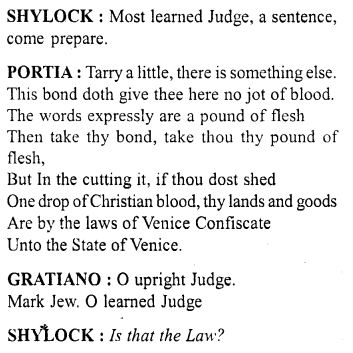
Paraphrase :
SHYLOCK : Most learned judge! A sentence! Come, get ready.
PORTIA : Wait a minute; there is something else. This promise to pay does not give you here a jot of blood; The words expressly are “a pound of flesh:” Then take your promise to pay, take your pound of flesh; But, in the cutting it, if you shed One drop of Christian blood, your lands and goods Are, by the laws of Venice, seized By the state of Venice.
GRATIANO : Oh, upright judge! Mark, Jew: Oh, learned Judge!
SHYLOCK : Is that the law?
Word Meaning With Annotation
Jot : tiny particle, is that the law : Shylock speaks in utter bewilderment,’ and appears a comic, hesitating figure on the stage, with all his arrogance and confidence gone.
Read the above passage and answer the following questions
Question 1.
Whom does Shylock call a “learned judge”? Why does he give such a praise to anyone?
Answer:
Shylock praises Portia as a learned judge. She is disguised as a young lawyer. She has interpreted the Venetian law. She has upheld the claim made by the Jew. She has declared that the bond’s forfeiture cannot be denied because Antonio has failed to repay the loan within the time limit. Shylock is delighted to hear a verdict favourable to him.
Question 2.
Shylock talks of a “sentence”. What is this sentence? Whom does he ask, “come, prepare”?
Answer:
Shylock talks of the sentence which gives to the Jew the right to cut off a pound of flesh from Antonio’s body. The court has awarded it according to the provisions of the law. He now victoriously turns Antonio to prepare himself for a deadly stab from his enemy.
Question 3.
“Tarry a little, there is something else,” What has been said already, to which something need be added?
Answer:
Portia interrupts Shylock as he moves towards Antonio. She asks him to wait a bit to consider some very important legal point. She has already awarded to the Jew a pound of flesh claimed by him. That was the simple meaning of the bond. But the young lawyer has a very fine point to make now. This will hinder the unqualified execution of the sentence.
Question 4.
What does the bond give the Jew ? What is it that it does not give him?
Answer:
Portia agrees that the bond entitles the Jew to receive his pound of flesh. But the words expressly mention only a pound of flesh and no more. It does not give him a single drop of blood.
Question 5.
What is the warning given to the Jew?
Answer:
Portia warns the Jew that he may cut off a pound of flesh but he should not shed a drop of blood. If he sheds one drop of Christian blood, his lands, hjs goods shall be confiscated by the state of Venice. This is the law of Venice.
Question 6.
Does Shylock continue to claim a pound of flesh from the merchant’s body? Does he change his stand at any stage? What is the consequence?
Answer:
When Shylock finds that he has been defeated on his own ground, he changes his stand. He; . agrees to receive three times the original sum. Bassanio is willing to make this payment But the r young lawyer pushes the Jew into a tight corner by telling him that he would be given no payment. He must have his bond. As a consequence, the Jew loses all his money. He also receives punishment for conspiring to take a citizen’s life.
Passage – 15 (Act IV, Sc.I, Lines 316-330)
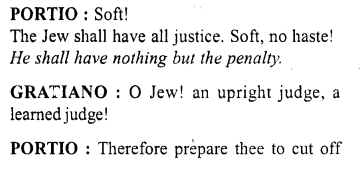
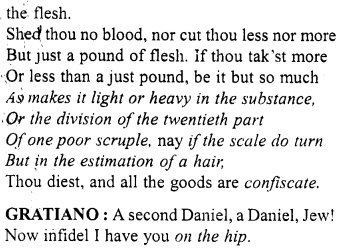
Paraphrase :
PORTIA : Wait! The Jew shall have all justice; wait! Don’t hurry:- He shall have nothing but the penalty.
GRATIANO : Oh, Jew! an upright judge, a learned judge!
PORTIA : So, get ready to cut off the flesh. Don’t shed any blood; or cut less nor more, Exactly just a pound of flesh: if you take more, or less, than a just pound, whether it is only so much That makes it light or heavy in the substance, or the division of the twentieth part of one poor scruple; no, if the scale turns only by a hair,You die, and all your goods are seized.
GRATIANO : A second Daniel, a Daniel, Jew! Now, infidel, I have you at a disadvantage.
Word Meaning With Annotation
He shall have nothing but the penalty : having led Shylock into the trap, Portia is determined not to let him off lightly. He was afforded numerous opportunities of withdrawing with a profit before this; now the tables are completely turned, and he who would show no mercy to Antonio is to have none himself, as makes it light or heavy in the substance : “As will make the amount of it light or heavy.” or the division of the twentieth part of one poor scruple : the word “or” seems to connect this with the previous line as an alternative. It is a repetition of the previous line, and the general sense is “ or if it varies from an exact pound by the twentieth part of a scruple.” A scruple was a very small unit of weight, if the scale do turn but in the estimation of a hair : “if it is estimated that one side of the scale varies from the other by as much as a hair’s breadth.” confiscate : an old past participle, equal to “confiscated” on the hip : this phrase is taken from wrestling. To have a man “on the hip” meant to secure such a hold on him that he was helpless, and could be easily thrown by his opponent.
Read the above passage and answer the following questions
Question 1.
Where does this dialogue take place and when?
Answer:
This dialogue takes place in a court of law in Venice; and it takes place after Portia has made it impossible for the Jew to cut off any flesh from Antonio’s body, and when the Jew expresses his willingness to accept the money and let Antonio go.
Question 2.
To whom are Gratiano’s remarks addressed, and what is the significance of these remarks?
Answer:
Gratiano’s remarks are addressed to Shylock. Gratiano’s remarks here are bitterly sarcastic. He is poking fun at Shylock and tormenting him with his savage irony. Indeed, Gratiano’s irony now is as savage as Shylock’s desire for revenge had previously been.
Question 3.
Who was Daniel?
Answer:
Daniel is the name of a Biblical personage. According to the Biblical account, Daniel was a man of exceptional wisdom. He delivered judgments which were unique in their wisdom and their justice.
Question 4.
Explain the line : “Now infidel I have you on the hip.”
Answer:
Gratiano describes Shylock as a misbeliever, and says that now he has the misbeliever in his grip. As a Christian, Gratiano regards a Jew as an infidel (or a non-believer in Christ and in the faith which Christ preached). To have somebody on the hip means to have him in one’s hold or in one’s grip.
Question 5.
What are your feelings as you go through this dialogue?
Answer:
We at this time feel greatly relieved because Portia has been able to rescue Antonio from the Jew’s clutches; and we also enjoy the manner in which Gratiano ridicules and mocks at Shylock who has been thwarted in his purpose. Gratiano shows an exceptional talent for making sarcastic remarks which are most appropriate at this time, and which the audience in a theatre would greatly relish. The tables have been turned upon Shylock; and Gratiano is now repeating Shylock’s own words in order to mock at him. We have here to remember that previously Shylock had used these words for the judge: “An upright judge, a learned judge! A second Daniel,” etc.
Passage – 16 (Act IV, Sc.I, Lines 343-359)
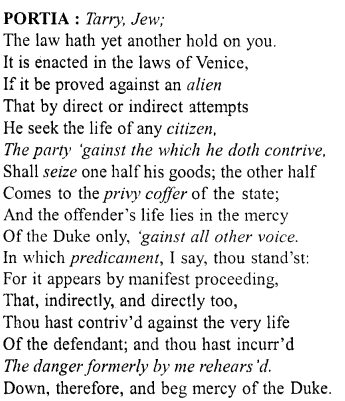
Paraphrase :
PORTIA : Wait, Jew. The law has yet another hold on you. It is enacted in the laws of Venice, That, if it is proved against an alien That by direct or indirect attempts He seek the life of any citizen, The party against whom he schemes Shall seize one half his goods; the other half Comes to the public treasury of the state; And the offender’s life lies at the mercy Of the Duke only, above all others. In which predicament, I say, you stand; Because it appears by this obvious proceeding That indirectly, and directly too, You have schemed against the very life Of the defendant; and you have incurred The danger that I just read to you. So, kneel down, and beg mercy of the Duke.
Word Meaning With Annotation
Tarry Jew : on the stage, Shylock is shown as startled by those words, wondering what fresh development is to come, alien : any foreigner or person not a native of Venice, citizen : a native of Venice, the party ‘gainst the which he doth contrive : this is in imitation of the Language of the law. Portia may be supposed to quote from the exact words of this particular law, “against the which” is particularly typical of the affected working of legal documents. It is thought that Shakespeare served at one time of his life in a lawyer’s office, and it is his accurate knowledge of legal terms which lends some show of probability to the theory, contrive : conspire; plot, seize : “take possession of’ or “become entitled to.” privy coffer : the state treasury, gainst all other voice : no other person except the Duke has power to decide whether the offender shall live pr die. difficult situation; position, the danger formerly by me rehears’d : the penalties which 1 have just stated.
Read the above passage and answer the following questions
Question 1.
What does Portia mean by telling Shylock that the law hath yet another hold on him?
Answer:
Portia means to say that Shylock is in the clutches of law in one more respect.
Question 2.
What has been laid down in the laws of Venice?
Answer:
The law of Venice say that if a foreigner has tried directly or indirectly to take the life of any native citizen of Venice, the victim shall be entitled to get one half of the property of the defaulter. The other half will be attached by the state treasury. The life of the defaulter would be at the mercy of the Duke.
Question 3.
Can the decision on the Judgement of the Duke be changed?
Answer:
No. It cannot be changed by any other person.
Question 4.
What does Portia find Shylock guilty of?
Answer:
She finds Shylock guilty of having plotted against the life of Antonio.
Question 5.
What does Portia order Shylock to do?
Answer:
Portia orders Shylock to go down on his knees and beg mercy of the Duke of Venice.
Passage – 17 (Act IV, Sc.I, Lines 372-386)
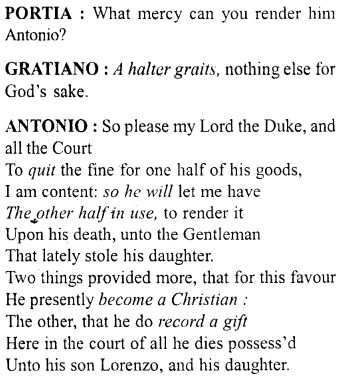
Paraphrase :
PORTIA : What mercy can you give him, Antonio?
GRATIANO : A free rope with a nooses; nothing else, for God’s sake!
ANTONIO : So if it pleases my lord, the Duke, and all the court To set the fine for one half of his goods, I am content, as long as he will let me have The other half to use, to give it, On his death, to the gentleman That lately stole his daughter: Two things more, that, for this favor, He presently becomes a Christian; The other, that he records a gift, Here in the court, of everything he has when he dies To his son, Lorenzo, and his daughter.
Word Meaning With Annotation
A halter gratis : a rope free of charge, to hang himself, quit : remit; excuse, so he will : on condition that he will, become a Christian : would be the cruellest blow of all for Shylock, for his adherence to the Jewish faith has seemed the only point in his nature which redeemed him from being purely mercenary, record a gift : “draw up a legal document for the assignment of property.” Such a document was called a “deed of gift”.
Read the above passage and answer the following questions
Question 1.
To whom does Portia expect Antonio to show mercy? What role is Portia playing?
Answer:
Portia is speaking to Antonio as a young lawyer interpreting the Venetian law in the court of the Duke. She asks Antonio if he will show mercy to Shylock.
Question 2.
Was Shylock earlier asked by Portia to show mercy to Antonio? What was his response then? What is his situation now?
Answer:
A short while ago, Portia had asked Shylock if he will show mercy to Antonio. Then it was Antonio in the dock. He had failed to repay the loan, and he was to lose a pound of his flesh to the Jew. The Jew then refused to have mercy on Antonio. He was not willing to receive his money with interest. He was bent upon cutting off a pound of flesh from the body of the defaulter.
Now the situation has reversed. Shylock who was in a winning position earlier, finds himself in a tight comer. He is now charged with conspiring to take the life of a Venetian citizen, i.e.’ Antonio. Antonio is now in a position to take mercy on the Jew’.
Question 3.
How this scene show difference between the attitudes of Jews and Christians?
Answer:
The scene bring out a contrast between the attitudes of Jews and Christians. This points has been emphasised by the Duke in his speech addressed to Shylock. The Duke said that the Christian spirit is to forgive while the Jewish spirit is to avenge. The Duke, being a Christian, forgave Shylock’s life even without his asking for it. But half of his wealth was given to Antonio. The other half which was to the treasury of the state, was to be commuted to a fine if Shylock showed a humbler attitude.
Question 4.
What does Antonio suggest about the fine which was to be charged by the state from the Jew?
Answer:
Antonio requests the Duke to remit that part of Shylock’s fine which is to go to the state. Shylock may be allowed to retain half of his property by paying a fine only.
Question 5.
What would Antonio do with the other half of the property?
Answer:
Antonio will receive the other part of the property belonging to the Jew, which he will keep in trust. This he will give to – Lorenzo (who has married Shylock’s daughter) at the death of the Jew.
Question 6
Comment on Antonio’s character as revealed in his response to this situation.
Answer:
Antonio gives that concession to Shylock on two conditions. First, he must become a Christian at once. Secondly, he must write a deed leaving all his property at his death to his son-in-law Lorenzo and his daughter. Jessica.
Thus. Shylock will be deprived of only half of his property which will be held in trust by Antonio, the other half will remain with him if executes a will bequeathing all his possessions to his daughter and son-in-law. Antonio’s gesture raises him further in our estimate. He is now a man without financial resources. He could have kept the Jew’s property. But he leaves his legal share for the Jew’s daughter.
Passage – 18 (Act IV, Sc.I, Lines 398-410)
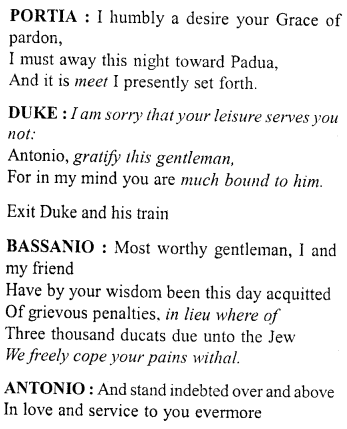
Paraphrase :
PORTIA : I humbly desire your Grace’s pardon; I must go away tonight toward Padua, And it is proper that I leave right away.
DUKE : I am sorry that you cannot stay. Antonio, thank this gentleman, Because, in my opinion, you owe him a lot. Exit Duke and his train.
BASSANIO : Most worthy gentleman, my friend and I Have been acquitted today Of grievous penalties by your wisdom; instead of Three thousand ducats, due to the Jew, We will freely pay for your courteous pains.
ANTONIO : And stand indebted, over and above, In love and service to you forever.
Word Meaning With Annotation
Meet : necessary. I am sorry that your leisure serves you not : I am sorry that you do not have the leisure time to come, gratify this gentleman : “reward this gentleman”, much bound to him : under a deep obligation to him.” in lieu whereof : “in requital of your services.” we freely cope your pains withal : “we freely remunerate you for your kindly labours.” No other case of cope being used in this sense is found in Shakespeare.
Read the above passage and answer the following questions
Question 1.
Where are Portia and the Duke? Why does Portia asks to be excused? What, in reality, is the reason for the excuse?
Answer:
Portia and the Duke are in the Duke’s court in the connection with the trial of Antonio who has failed to repay the loan to Shylock. Portia is disguised as a young lawyer, interpreting the’law of
After the trial is over, the Duke invites Portia for a dinner at his residence. Portia begs to be excused for not being able to join him. She says that she has to reach Padua, and for that she must start immediately. In fact, Portia will not waste any moment after the court is adjourned, since she with Nerissa has to reach Belmont before their husbands do.
Question 2.
Why does the Duke call Portia a “gentleman” ? Give the meaning of the word ‘gratify’. Why, according to the Duke, must Portia be gratified?
Answer:
The Duke calls Portia a gentleman even though she is a woman. It is because she is dressed as a young lawyer, posing to be a gentleman and not a woman. The word ‘gratify’ here means to give reward for something done by the young lawyer. The Duke asks Antonio to thank and reward the young lawyer, Portia, who is solely responsible for saving his life. As a judge, it seems strange that she should accept any reward. But it is necessary for the needs of the drama which concludes with the happy resolution of the ring- episode.
Question 3.
What does Bassanio offer to Portia in order to gratify her on Antonio’s behalf? What does Antonio say in support of Bassanio’s offer?
Answer:
On behalf of Antonio, Bassanio comes forward. He expresses his gratitude to Portia for releasing his friend from the worst forfeiture and penalty. For this he gladly offers that sum of three ‘ thousand ducats as compensation for the lawyer’s efforts.
Antonio supports his friend’s offer by saying that no amount of money can repay their debt of gratitude for the lawyer. They would owe love and service to him for ever.
Question 4.
How does Portia respond to Bassanio’s offer? What does Bassanio ask Portia to grant him. What two things Portia asks for? What is the humour in the conversation that follows?
Answer:
Portia speaks humbly that she is satisfied with what she has done. Thus his effort has been fully paid. She has been fully compensated by having succeeded in saving the gentleman from a harsh penalty. She never did anything for money. She only wishes them to recognize her when they meet again. This simple sentence has a deeper meaning. When they meet again. Bassanio would not recognize her in his wife the erstwhile lawyer.
Bassanio insists on the lawyer accepting some token of remembrance. He wants her to grant this request to him. She then agrees to accept a pair of gloves and the ring which Bassanio is wearing on his finger. Now Bassanio tries hard to save this ring, and Portia refuses to accept anything else. Finally, Bassanio has to yield.
Question 5.
Briefly state your opinion of Portia at this point of the play.
Answer:
The trial scene ends with a note of comedy. We see the situation growing tense in the beginning, but with Shylock’s defeat the atmosphere changes. And all this is the outcome of the role played by Portia. We admire Portia for her sharp intelligence, her self-possession, her sagacity, her sweet reasonableness and her capacity for practical jokes.
Passage – 19 (Act IV. Sc.I, Lines 430-444)
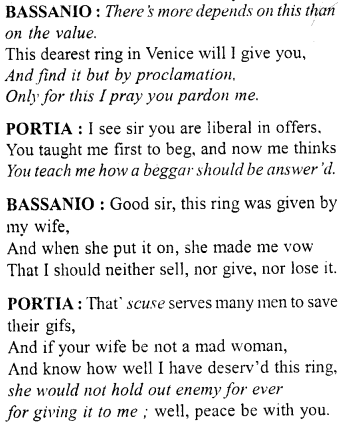
Paraphrase :
BASSANIO : There’s more that depends on this ring than its value. I will give you the most expensive in Venice, And find out where it is by proclamation: Only for this ring, please, excuse me.
PORTIA : I see, sir, you are free in making offers; You taught me to beg first, and now I think You teach me how to answer a beggar.
BASSANIO : Good sir, this ring was given me by my wife; And, when she put it on, she made me vow That I should not sell, or give, or lose it.
PORTIA : That’s the excuse many men use to save their gifts. And, if your wife is not a mad woman, And knows how much I have deserved this ring, She would not hold out in being your enemy forever For giving it to me. Well, goodbye!
Word Meaning With Annotation
There’s more depends on this than on the value : “This ring is of sentimental, rather than intrinsic value.” and find it but by proclamation : he will cause it to be proclaimed in Venice that he wishes to buy an expensive ring, so that he may receive specimens from the various jewellers and select the best one. only for this I pray you pardon me : but excuse me from giving this one thing, you teach me how a beggar should be answer’d : and now you refuse me, as one sually does a beggar, scuse : a contracted form of “excuse.” she would not hold out enemy for ever for giving it to me : “she might be angry on first hearing of it, but she would not retain her anger for long when she had heard Bassanio’s explanation.” Portia’s reasons are skilful and sound, and make Bassanio appear very mean in refusing such a simple request. She goes away in a mood of hurt and offended dignity, yet full of quiet courtesy, and makes Bassanio look even more discourteous
Read the above passage and answer the following questions
Question 1.
“There is more depends on this than on the value.” What is meant by this statement. Why has Bassanio to say this?
Answer:
Bassanio says these words to Portia who insists on having his ring as a reward for her role in the trial before the Duke. Bassanio explains to the young lawyer that the ring has a significance for him beyond its price. He wants to be true to his oath to his wife.
Question 2.
What does Bassanio promise to give Portia? What for? What is he unwilling to give her?
Answer:
Bassanio promises to give Portia the most expensive ring available in Venice. He will find it by openly announcing it in the city that he is ready to buy such a ring. But he is unwilling to give her the ring he is at present wearing on his finger:
Question 3.
What does Portia protest in response to Bassanio’s words, “only for this I pray you pardon me.”
Answer:
When Bassanio begs to excused for not sparing his own ring, Portia pretends to be offended at his refusal. She taunts him for not keeping his promise to give her whatever she asked for and. She protests that first he pressed upon her a gift, and when she asked for it, he held it back. Thus, he has treated her like a begger.
Question 4.
Why does Bassanio reveal the secret of the ring?
Answer:
Portia will not listen to any of Bassanio’s entreaties. She must have the ring. Bassanio is thus ultimately forced to reveal the secret of the ring. This is the ring which his wife gave him with a pledge that he would not lose it, itt is for this reason that the ring has its emotional value far beyond the actual value in terms of money.
Question 5.
How does Portia induce Bassanio to part with the ring?
Answer:
Portia then induces Bassanio to part with his ring by saying that” unless his wife were mad, she would not quarrel over his giving it to so deserving a person as the lawyer who had saved his dearest friend’s life. Her reasons are sound and her argument is skillful. All this makes Bassanio appear very mean in refusing such a simple request.
Question 6.
At what stage does Antonia intervene to settle the issue? What follows this?
Answer:
In a mood of pretended annoyance, Portia leaves the scene. In her absence, Antonio prevails upon Bassanio to make a gift of the ring to the young lawyer. He wishes that the great service done by the lawyer combined with Bassanio’s love for his friend may prove stronger than the command which Bassanio’s wife gave him. Bassanio can no longer resist. He sends Gratiano with the ring to be given to Portia. There, Gratiano is also going to lose his ring to Nerissa who will make such a demand from him.
For More Resources
